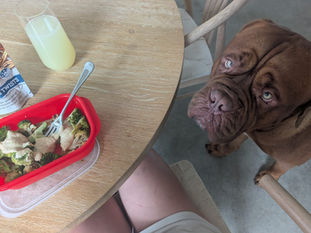
Furry Friends - the importance of dogs having mates
0
11
0
In the months since I started Dog Days, something has become crystal clear.
Dogs thrive when they have friends. Dog friends, that is.
Recently there have been studies that are proving that aging dogs benefit greatly from social interactions and time spent with peers.
I’ve seen is huge character arcs - dogs that are only fur babies in their home, who arrive a little anxious, maybe heightened, their social cues not so great, relax, become more open to cues and take the lead from the older dogs who show them the ropes of spending time together.
Clients have said their dog seems calmer, even at home, less triggered by things and importantly, more receptive to cues after spending a day a week in a small daycare, or after a holistay.
What I’ve noticed is this: when dogs spend regular time with other dogs they like (and I do have to stress this, dogs should be given the autonomy to choose their mates) in a safe environment, they become more confident, more responsive to tasks or cues, and less anxious. It’s incredible to watch!
I recently learned that anthropologists are reassessing the timeframe in which they surmise humans and dogs have been hanging out. It could be over 40,000 years! With this in mind, since we’ve grown up together, it makes sense that our need for friends, connection, community and socialisation is starting to look very similar to that of our best friends’.
So if your pup seems down, or crazy excited when you come home, perhaps think about some socialisation once a week. Daycare, group walk or meet ups with likeminded folks at the local park.
Watch your dog, let them play, don’t talk to them - let them dog. See if there’s a difference.
If you're seeing behavioural issues like nipping, overexcitement jumping, barking, shredding furniture - this could all be because your pup needs more stimulation. Instead of another toy, what about a new friend?
Remember, when introducing dogs, find a neutral place (maybe not a crowded dog park) and be a positive part of their meeting - positive words, treats and keep an eye on body language. If you have a nervous dog, advocate for them, let them come back to you for physical reinforcement, pat the other dog, make eye contact and keep it nice and short - unless they hit it off and start rumbling straight away.
Get in touch if you would like to see if you'd like to see if more mate time is for your dog.






